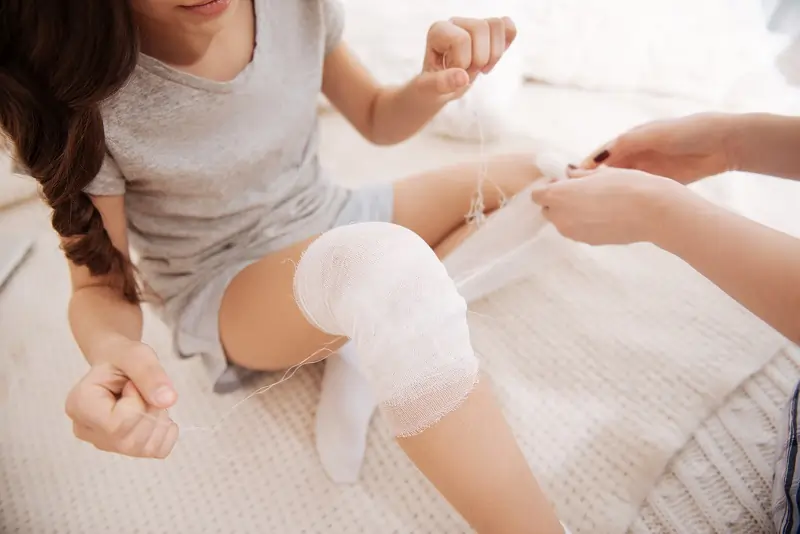What is wound care at home ?
Wound care at home is a critical component in promoting healing and preventing infections in patients recovering from surgery or injury. Proper management can significantly affect the healing process, reducing the risk of complications. Key practices include maintaining cleanliness, performing gentle cleaning with mild soap and water, and using sterile supplies for dressing changes.
Dressing changes should be done regularly, following healthcare provider recommendations, to keep the wound environment optimal. It's essential to monitor the wound closely for signs of infection, such as increased redness, swelling, warmth, and discharge. Patient education plays a vital role; understanding how to care for wounds can empower patients to take an active role in their recovery.
By adhering to these practices, individuals can enhance their body’s natural healing capabilities while minimizing the risk of infection. Correct home wound care ensures a smoother recovery journey for patients, ultimately leading to better health outcomes.
Offered home wound care services
Home wound care services play a vital role in the recovery process for individuals dealing with various types of wounds, whether from surgery, injury, or chronic conditions. These services are designed to provide personalized care directly in the patient's home, enhancing comfort and convenience while ensuring proper treatment and management of wounds.

A trained healthcare professional assesses the wound, implements appropriate care techniques, and educates the patient and their family on how to maintain wound hygiene and promote healing. The integration of home wound care not only reduces the risk of infection but also minimizes hospital visits, allowing patients to heal in a familiar environment tailored to their personal needs. This service is especially beneficial for individuals with mobility challenges or those requiring ongoing care, ensuring they receive the attention and expertise necessary for optimal recovery.
Holistic Approach

A holistic approach to well-being emphasizes the importance of viewing individuals as interconnected systems rather than as isolated symptoms. By considering the whole person—encompassing emotional, physical, and social factors—this comprehensive perspective allows us to address issues more effectively.
Emotional health plays a vital role in overall well-being; negative emotions can lead to physical ailments and social disconnection. Conversely, a strong support network enhances resilience and promotes healing. Physical well-being, including nutrition, exercise, and rest, is equally critical, as it influences our emotional and social lives.
By adopting systems-thinking, we recognize that our experiences and challenges are intertwined. This interconnectedness means that effective solutions require understanding the relationships between various elements of our lives. Embracing a holistic approach fosters a deeper understanding of well-being, empowering individuals to achieve balance and harmony across all aspects of life. In doing so, we can cultivate healthier, more fulfilling lives that encompass all dimensions of the human experience.
Comprehensive Training
Comprehensive training is vital for enhancing employee skills and driving organizational success. By investing in employee development, organizations cultivate a proficient workforce equipped to meet today's challenges. Diverse methods employed in comprehensive training, such as on-the-job training, mentorship programs, and e-learning platforms, cater to various learning styles and preferences, ensuring all employees can engage and grow effectively.
On-the-job training provides hands-on experience, while mentorship programs foster personalized guidance and support. E-learning platforms offer flexibility, enabling employees to learn at their own pace and convenience. These varied approaches not only enrich skill enhancement but also promote a culture of continuous learning.
The measurable benefits of comprehensive training are substantial, leading to increased productivity and higher employee retention rates. Organizations that prioritize training often see improved job satisfaction, reduced turnover, and enhanced performance, ultimately driving long-term success. By recognizing the value of comprehensive training, organizations can create a thriving environment that nurtures talent and fosters innovation.
Wound Specialist Oversight
Wound specialists play a critical role in overseeing patient care for individuals with complex wounds, leveraging their expertise to manage intricate conditions effectively. These specialists assess, diagnose, and develop tailored treatment plans, ensuring optimal healing and minimizing complications. Their deep understanding of wound healing processes and advanced therapies significantly enhances patient recovery.
Interdisciplinary collaboration is vital in wound management, as it brings together diverse healthcare professionals including nurses, physicians, physical therapists, and dietitians to create a comprehensive approach to treatment. This teamwork fosters effective communication, ensuring that all aspects of a patient’s health are considered, which is essential for optimal outcomes.
By coordinating efforts among these various disciplines, wound specialists help streamline care processes, facilitate rapid interventions, and enhance the overall patient experience. The impact of their oversight is profound, leading to improved recovery rates and better overall health for patients. Ultimately, the synergy produced through interdisciplinary collaboration not only advances wound management techniques but also elevates the standard of care in the healthcare system.
Cutting-Edge Technology
Cutting-edge technology, particularly advancements in artificial intelligence (AI), machine learning, and automation, is transforming industries worldwide. These innovations are driving efficiency by optimizing processes and minimizing human error, allowing businesses to streamline operations and reduce costs. For instance, in manufacturing, automation technologies enable precise production and inventory management, vastly enhancing productivity.

Machine learning algorithms analyze vast datasets to uncover insights, predict market trends, and personalize customer experiences, thus creating new opportunities for growth. In the healthcare sector, AI-powered diagnostic tools enhance patient care by delivering faster and more accurate analyses, leading to improved health outcomes.

Moreover, businesses are leveraging AI-driven chatbots to enhance customer service, providing instant responses and freeing human agents to tackle more complex issues. Companies adopting these technologies gain a competitive edge in an ever-evolving market, ensuring they stay relevant and responsive to consumer needs.
Smooth Care Transitions
Smooth care transitions are essential for ensuring continuity of care as patients move between various healthcare settings, such as hospitals, outpatient facilities, and home-based care. These transitions play a crucial role in maintaining patient safety and promoting optimal health outcomes. Effective communication and coordination among healthcare providers are vital during this process, as they help to reduce the risk of errors such as medication discrepancies or overlooked follow-up appointments that can occur in the absence of a cohesive care plan.
Additionally, patient education and support during these transitions significantly enhance the overall experience for patients. By informing them about their treatment plans, ensuring they understand their medications, and providing guidance on follow-up care, healthcare providers can empower patients and increase their engagement in the healing process. This active participation not only fosters trust but also improves adherence to medical advice, thereby promoting better health outcomes.
Why you should Choose to Perform Wound Care at home?
Performing wound care at home offers numerous benefits, making it an appealing option for patients. Convenience is a major advantage, as it allows individuals to manage their care in a familiar environment, fostering patient comfort and emotional well-being. Home care is also cost-effective, eliminating the costs associated with hospital visits and potential overnight stays.
Additionally, receiving care at home can significantly enhance recovery. Patients are in a comfortable setting, which can promote relaxation and healing. Furthermore, home care reduces the risk of hospital-acquired infections, ensuring that wounds receive the attention they need without the added exposure to germs commonly found in medical facilities.
Key to successful home wound care is the education and support provided by healthcare professionals. They equip patients with the necessary skills and knowledge to manage their wounds effectively, ensuring that care is tailored to individual needs. This personalized approach enhances overall recovery and promotes a sense of autonomy in managing one’s health. In summary, choosing home health for wound care is a practical and effective solution for many patients.
Who can benefit from wound care at home?
Wound care at home has emerged as a practical solution for a variety of individuals who may require ongoing treatment and management of their injuries. It is particularly beneficial for patients recovering from surgery, those with chronic conditions such as diabetes that predispose them to foot ulcers, and elderly individuals who may have limited mobility or access to healthcare facilities. Additionally, caregivers of individuals with cognitive impairments can find at-home wound care advantageous,
allowing for a more personalized and comfortable rehabilitation environment. With advancements in telehealth and home medical supplies, support is more accessible than ever, empowering patients and caregivers to effectively manage wounds while enabling quicker recovery times and potentially reducing hospital readmissions. This approach promotes independence, enhances quality of life, and allows for tailored care that meets specific medical needs in the comfort of home.
Home wound care insurance plans
Wound care insurance plans are designed to provide coverage for various treatments and therapies for chronic or acute wounds. These plans typically include coverage options for specialized treatments such as advanced dressings, negative pressure wound therapy, and hyperbaric oxygen therapy. Understanding the specifics of each plan is crucial, particularly concerning deductibles, copayments, and the types of wounds covered.

Having insurance for wound care offers multiple benefits, including access to specialized care from skilled professionals. This specialized care can lead to better treatment outcomes and faster healing times, which is vital for individuals with complex wounds. Additionally, wound care insurance can provide significant cost savings by reducing out-of-pocket expenses for necessary treatments, which can otherwise be financially burdensome.

Overall, wound care insurance plans enhance patient access to critical treatments while protecting against unforeseen expenses, ensuring a comprehensive approach to managing and healing wounds effectively. Understanding the nuances of coverage options and costs can empower patients to make informed decisions about their care.
What to expect from home wound care?
Home wound care is an essential aspect of recovery for patients with various injuries or surgical sites, allowing for healing in the comfort of one's own environment. It typically involves cleaning, dressing, and monitoring wounds to prevent infection and promote optimal healing.
As patients transition from clinical care to home care, understanding what to expect can alleviate anxiety and promote confidence in managing their healing process. Various factors, including the type and severity of the wound, the individual's overall health, and the guidance provided by healthcare professionals, shape the home care experience.
With the right knowledge and preparation, patients and caregivers can successfully navigate the challenges of wound management, ensuring a smoother healing journey. The following sections will outline key aspects of home wound care, including best practices for cleaning and dressing wounds, signs of infection to watch for, and the importance of follow-up care.
Personalized Care Plan
A Personalized Care Plan is a vital tool in modern healthcare, emphasizing the importance of tailoring medical care to the individual needs of patients. By considering each patient’s unique medical history and preferences, healthcare providers can create highly customized strategies that optimize treatment and support overall well-being.
These plans significantly enhance patient engagement by involving individuals in their own care processes. When patients see their specific needs recognized and addressed, they are more likely to actively participate, fostering a collaborative relationship with their healthcare team. This active involvement correlates with improved health outcomes, as patients adhere better to personalized treatments that resonate with their lifestyles and goals.
Additionally, Personalized Care Plans provide a structured approach to treatment management, allowing for the systematic tracking of progress and adjustments as needed. This tailored framework not only addresses immediate health concerns but also promotes long-term wellness, ensuring patients receive the most effective care possible. By integrating personalized care into healthcare practices, we can move toward more effective, patient-centered solutions that yield better health outcomes for all.
Wound Home Care Visits
Wound home care visits play a crucial role in managing patient recovery effectively. These visits facilitate regular monitoring of wound healing, ensuring that any complications are identified and addressed promptly. By having healthcare professionals evaluate the wound condition in the patient's home, the risk of infection can be significantly reduced, enhancing overall recovery.
Additionally, wound care home visits provide invaluable patient education. Patients learn self-care practices that empower them to take an active role in their recovery, which can lead to improved outcomes and increased confidence in managing their wounds. This education is essential for promoting proper hygiene, understanding signs of infection, and ensuring adherence to care regimens.
Furthermore, these visits contribute significantly to patient comfort, allowing them to heal in the familiarity of their own environment. By reducing the need for frequent hospital visits or admissions, wound home care enhances quality of life while also alleviating pressure on healthcare facilities. Overall, wound home care visits are integral to effective recovery, infection prevention, and patient education, ultimately resulting in better health outcomes.
HOW TO FIND A WOUND CARE SPECIALIST
Finding a qualified wound care specialist is crucial for effective treatment and healing of chronic or complex wounds. Understanding how to navigate this process can significantly impact your recovery journey and overall health.
This guide will outline the essential steps to take when searching for a specialist, including the criteria you should consider, where to look for potential candidates, and the importance of asking the right questions during your search. By following these guidelines, you can ensure that you receive the optimal care needed to address your specific wound care needs.
Talk to Your Doctor
Before making any significant changes to your health regimen, it’s crucial to consult with your doctor. They can provide personalized advice tailored to your individual medical history and current health status. This collaborative approach allows your doctor to help identify potential risks associated with new strategies, ensuring that these initiatives align with your overall health goals.

By engaging in a thorough consultation, you can gain insights into how different modifications may impact your health. Your doctor can guide you in choosing safer, more effective options, ultimately leading to better outcomes. This partnership between you and your healthcare provider fosters a proactive attitude towards health improvement while minimizing any possible adverse effects.
Remember, personalized advice from your doctor is invaluable in navigating the complexities of health changes. Always prioritize a consultation to ensure that you are on the right track to achieving your wellness aspirations safely and effectively.
Check Quality Scores
Quality scores are essential in assessing the performance of digital marketing campaigns, as they measure the relevance of ads, keywords, and landing pages to users. High-quality scores indicate that your ads are closely aligned with what users are searching for, enhancing ad performance and increasing the likelihood of clicks. This relevance not only improves user experience but also signals to platforms like Google that your ads are valuable.
Improving quality scores can lead to better ad positions, meaning your ads appear higher in search results. This visibility is crucial for capturing user attention and increasing conversion rates. Additionally, higher quality scores often result in lower cost per click (CPC) since search engines reward relevant ads with discounts, allowing you to maximize your marketing budget.
Ask Questions
Asking questions is a critical skill in effective communication that enhances both individual and group interactions. When individuals master the art of inquiry, they unlock the potential for deeper understanding of complex issues and diverse perspectives. By formulating and posing the right questions, one can encourage participation, prompting team members to share their insights and experiences actively.
In collaborative environments, engaging team members through thoughtful questions fosters an atmosphere of openness and trust. This engagement not only stimulates innovative ideas but also strengthens relationships among colleagues. As questions delve deeper into challenges, they uncover underlying assumptions and facilitate more meaningful discussions.
Ultimately, the practice of asking questions transforms communication from mere information exchange to a dynamic dialogue, driving collaboration and collective problem-solving. By prioritizing inquiry in conversations, teams can harness the benefits of effective communication, leading to enhanced engagement, shared understanding, and more productive outcomes.
Wound Care at Home Summary
Effective wound management at home is crucial for optimal healing and infection prevention. Key practices include maintaining cleanliness by washing hands before and after handling the wound, and using sterile materials during dressing changes. Moisture management is also vital; keeping the wound slightly moist can promote healing while preventing it from becoming too wet, which can lead to infection. Regular monitoring for signs of infection—such as increased redness, swelling, or unusual discharge—ensures any issues are addressed promptly.
Education plays a critical role in empowering both patients and caregivers to manage wounds confidently. Understanding the essentials of wound care enhances the ability to recognize when professional help is necessary. By arming themselves with knowledge about wound care techniques and infection prevention strategies, individuals can significantly improve healing outcomes, ensuring a smoother recovery process at home.
Implementing these practices effectively requires ongoing commitment to patient education, which fosters independence and promotes proactive wound management.